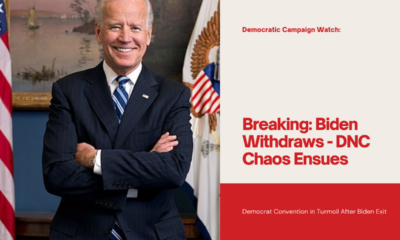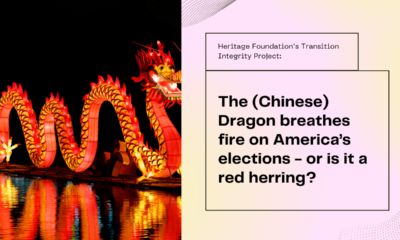Civilization
Calls To Ban Wildly Powerful TikTok Are Self-Contradictory
An economist casts doubt on the proposition that TikTok will help the Chinese subvert America, suggesting the threat is to China.

In a recent guest column for RealClearPolitics, Chris Fenton wrote with alarm that TikTok will soon control the entertainment industry – and ultimately American culture itself. Fenton believes TikTok’s presence in the U.S. amounts to an “epidemic,” and fears the platform is poised to powerfully “shift shapes” of U.S. culture.
Fenton is not alone in his fear about TikTok, which is why it’s important to address the platform’s critics. There is another way of looking at TikTok’s success stateside, along with the presumption that it uniquely has the power to shape how people see the United States, China, and the world more broadly.
As Fenton likely knows from his extensive experience in China, the Chinese people are in the midst of a passionate love affair with all things American. Fenton, whose own professional experience is in the film business, acknowledges the citizenry’s interest in American movies, but this is a small part of it. Apple sells one-fifth of its iPhones in China, there are 5,500 McDonald’s in China now with plans for 10,000 by 2028, along with 6,800 Starbucks in China – with thousands more planned – and on and on.
The remarkable ubiquity of American symbols of capitalism throughout China is not, in itself, a rebuttal to those worried that Beijing authorities will gain access through TikTok to Americans’ private information. More on that in a bit.
At the same time, it’s very telling just how dense China is with American products and services. If TikTok really is a vehicle for something sinister in the U.S., the passion of the Chinese people for Americana exists as a useful data point that at the very least calls into question so much of the worry about TikTok’s ability to influence the American people. The app didn’t dampen reverence within the Chinese citizenry about the United States, so why is it realistic to presume that it will achieve in the U.S. what it apparently hasn’t in China?
At the same time, the pervasiveness of American companies in China helps illustrate what a global economy in the information age looks like. The big picture is that the influence of American culture is far more prevalent in China than the other way around. That in mind, the thought that one app can overwhelm the vast influence of U.S. broadcast networks, movie studios, social media entities, publishers, musicians, fashion designers, and social “influencers” seems far-fetched.
Better yet, the aforementioned ubiquity of all-things-American in China speaks to a more positive way of looking at TikTok’s immense popularity in the U.S. Lest we forget, to export is to import. As TikTok and other Chinese companies grow in stature in the United States, so grows the ability of the Chinese people to consume more and more of what’s created here. It seems American companies understand this truth best, as evidenced by their plans to aggressively expand their commercial footprints in China. Put another way, Chinese companies can’t increase their presence in the U.S. without a commensurate growth of the U.S. presence in China.
Instead of viewing TikTok as a threat to American culture, its popularity in the United States signals a rising – and mutually beneficial – American presence in China. TikTok critics should remember that trade is a two-way street, and the growth of American culture in China is and will be a happy consequence of an increased TikTok presence in the United States.
What about frequently expressed fears that TikTok exists as a way for Beijing and/or the Chinese Communist Party (CCP) to access private information about Americans? The simple answer is that if that were the goal, then TikTok is superfluous. Information about the U.S. citizenry is broadly available, and can be purchased with ease. The narrative about TikTok as a front for the CCP is self-correcting. Seriously, when have businesses controlled by governmental entities ever achieved mass appeal? In other words, TikTok’s popularity itself is evidence that it’s not an agent of malign forces inside the CCP.
At the same time, it’s worth remembering that the frequently expressed purpose of reining in TikTok by its American critics is a way of limiting authoritarian Chinese influence in the United States. Okay, but for now it’s the Chinese authorities who are actively banning beloved American creations like Facebook, albeit in China. How unfortunate if the U.S. political class mimics what Chinese officialdom does as a way of protecting us from Chinese influence.
It’s a long way of saying that the ban proposed by Chris Fenton et al, while rooted in good intentions, is inimical to the American Way. Worse, and the with two-way nature of trading well in mind, what limits the inflow of Chinese goods, services and apps here naturally limits the inflow of Americana into China. If we’re confident in the American Way we should be extra confident in the rising embrace of it, which can only happen insofar as our local markets remain free and open to the world’s plenty, including China’s.
This article was originally published by RealClearPolitics and made available via RealClearWire.
-

 Executive4 days ago
Executive4 days agoSecret Service chief gets no solace
-

 Civilization5 days ago
Civilization5 days agoBiden drops out of race
-

 Executive2 days ago
Executive2 days agoWaste of the Day: Louisville Taxpayers Pay Nearly $600,000 For Empty Building’s Maintenance, Security
-

 Guest Columns4 days ago
Guest Columns4 days agoFear Itself: Democrats’ Favorite Strategy Caused Their Current Chaos
-

 Executive3 days ago
Executive3 days agoWhere is Joe Biden – or Jill?
-

 Executive1 day ago
Executive1 day agoWaste of the Day: Throwback Thursday: Cities Used Crime Prevention Funds on Soccer Games, Paper Shredding
-

 Civilization4 days ago
Civilization4 days agoBuild Iron Dome in the United States To Prepare for Israel’s Worst Day
-

 Executive2 days ago
Executive2 days agoFacile and politically motivated suggestions














